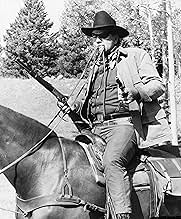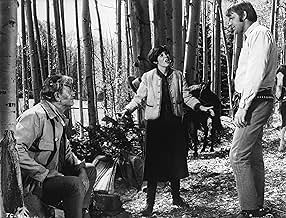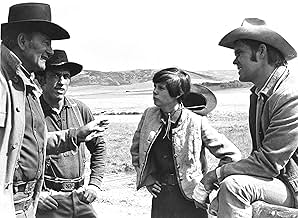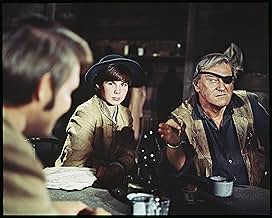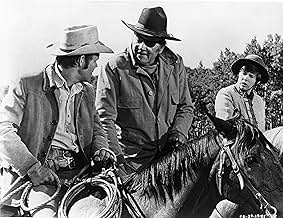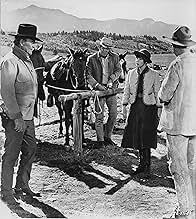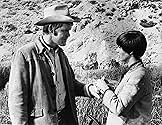Um marechal alcoólatra e um guarda-florestal do Texas ajudam uma adolescente teimosa a localizar o assassino de seu pai em território indiano.Um marechal alcoólatra e um guarda-florestal do Texas ajudam uma adolescente teimosa a localizar o assassino de seu pai em território indiano.Um marechal alcoólatra e um guarda-florestal do Texas ajudam uma adolescente teimosa a localizar o assassino de seu pai em território indiano.
- Direção
- Roteiristas
- Artistas
- Ganhou 1 Oscar
- 6 vitórias e 7 indicações no total
- Direção
- Roteiristas
- Elenco e equipe completos
- Produção, bilheteria e muito mais no IMDbPro
Avaliações em destaque
What True Grit does is succeed on both levels, being both great entertainment and giving John Wayne the acting role of a lifetime in the person of Rooster Cogburn.
Mattie Ross from Darnell and Yell County Arkansas personified by Kim Darby has come to Fort Smith seeking the killer of her father Jeff Corey. Turns out he's also killed a State Senator in Texas so Texas Ranger Glen Campbell informs her. Both of them team up with United States Marshal Rooster Cogburn who resides in Fort Smith with Chin Lee and my favorite movie cat, General Sterling Price.
Corey is now in the outlaw band headed by Robert Duvall at large in the Indian Nation Territory that became Oklahoma. True Grit's plot is the trio's pursuit of Duvall, Corey and the rest of the gang.
But oddly enough True Grit isn't really about plot. It's about the creation of a character. Like Margaret Mitchell who wrote Gone With the Wind with Clark Gable in mind for Rhett Butler, Charles Portis wrote the novel True Grit with only John Wayne in mind as Rooster Cogburn. It must have been one singular delight for Charles Portis to see the Duke flesh out Rooster Cogburn exactly as he conceived him.
Tough old Rooster, likes an occasional drink, isn't above a little larceny, but has one stern moral code about real bad guys. Bring him in dead or alive and make sure you shoot first coming up against them. And he's got quite the colorful past as he relates tales of his younger days to Campbell and Darby on the trail.
In other reviews I've said that John Wayne had one of the great faces for movie closeups. You can see a perfect example of that in that scene with John Fiedler who plays Darby's lawyer J. Noble Daggett. A man who rates high in the legal profession in that area having forced a railroad into bankruptcy.
The camera is facing Fiedler as he's talking to Wayne about his visit with Darby who's life Wayne saved. Wayne's got about a third of his face to the camera. But even with that third, your eyes are focused on the Duke and his reactions and then as the camera slowly pans around to Wayne in full face his reaction shots are hysterical. You don't work with scene stealing character actors like Chill Wills, Walter Brennan, and Gabby Hayes for 30 years without learning something.
John Wayne was up against some stiff competition in 1969 for the Best Actor Oscar. It was his second nomination, the first being for Sands of Iwo Jima. He was facing Richard Burton as Henry VIII in Anne of a Thousand Days and a couple of newcomers named Dustin Hoffman and Jon Voight for Midnight Cowboy. He was certainly the sentimental favorite.
If in no other place in our lives, sentiment does have its place in cinema. It was an honor well deserved, not just for one performance but for a lifetime of achievement in cinema being the player who put more people into movie seats than any other person ever. So many of the Duke's contemporaries like Edward G. Robinson, Errol Flynn, Tyrone Power were never even nominated for an Oscar much less win one.
Because the Motion Picture Academy has deemed this John Wayne's grandest cinematic achievement, it's almost a command to support this fine western and the man who defined the western hero and is still defining it.
Gentle entertainment about a tough-minded , hard-bitten bounty hunter and a fearless bargainer , stubborn adolescent in the Old West starred by the master of the western , an over-the-hill John Wayne , he is magnificent expert in the art of conjuring stylish , here stars this atypical but amusing western with a lot of jokes , distinguished moments , comical attitudes but also violence and action . Wayne deservedly won his best actor Academy Award for this 1960 portrayal of the boozy Marshal . Likable Kim Darby as an obstinate teen is very good , she is extremely quick-witted and confident . The enjoyable story is enhanced for entertaining moments developed among main characters and especially on the relationship between John Wayne and Kim Darby . Impressive final scenes dealing with a spectacular showdown between Rooster Cogburn and chief baddie well played by Robert Duvall. The stellar cast is accompanied with familiar hearted features , some excellent secondary actors as Robert Duvall , Dennis Hooper , Strother Martin , Jeff Corey , Jeremy Slate , Dennis Hooper , among others . Splendid musical score by Elmer Berstein in his usual style as 'The Magnificent seven' , 'The Comancheros' and '4 sons of Katie Elder' . Coloful cinematography by Lucien Ballard , mostly filmed in Natural parks from Montrose, Colorado,Owl Creek Pass ,Ridgway, Colorado, Sherwin Summit, Inyo National Forest and Durango, Mexico . Followed by a sequel titled ¨Rooster Cogburn¨ with Wayne and Katherine Hepburn and a TV movie with Warren Oates and Lisa Pelikan .
Well and professionally realized by Henry Hathaway with strong screen presence by John Wayne , both of whom collaborated in various Westerns , they included ¨Five Card Stud¨ , ¨North to Alaska¨ , ¨Rooster Cogburn¨ and ¨4 sons of Katie Elder¨ . Hathaway himself was only even nominated for an Oscar , but his movies themselves are testimony to his skills to heighten narrative tension and shoot action so exhilarating it made adrenalin run . Henry was a craftsman who had a long career from the 30s with successful films , and especially Westerns , as ¨Brigham Young¨ and ¨Raw Hide¨ . In his 60s Hathaway still got the vigour to make some fiery movies as ¨From Hell to Texas¨, ¨How the West was won¨, ¨Nevada Smith¨, and ¨Shoot out¨ . He was an expert on Western genre as he proved in ¨True grit , Five card stud , Nevada Smith , How the West was won , Rawhide , Brigham Young , Buffalo Stampede, Garden of evil¨ and ¨The sons of Katie Elder¨. Rating : Better than average , nice Western that will appeal to John Wayne fans. Action , interesting plot , top-notch performance and breathtaking last half hour make it fine screen amusement . It's still one of the Duke classics .
Why this film hasn't had more votes and a higher rating in imdb is a complete mystery to me. I'm English, and I always thought the Americans really loved their westerns and John Wayne in particular. Can anyone explain please?
John Wayne's parting comment in this film is directed as much at us the viewers as it is at the young woman his Rooster Cogburn character is addressing. In a way, Wayne throughout the film plays off the image he cemented in dozens of great and near-great westerns, with a nod that by 1969, he along with the western genre had fallen behind the times, that his shoot-first approach to law and order had worn thin with the critical establishment just as it does in Judge Parker's courtroom.
In that way, playing a character of such dogged homicidal cussedness as the hard-drinking, one-eyed ex-Quantrill Raider Rooster Cogburn and giving him a teenaged girl seeking justice to play off so as to showcase his essential decency seems a clever means to win Wayne an Oscar, which he finally did here, a sentimental triumph over some more heralded performances. With such an attitude, you might think "True Grit" would come off a bit of a one-trick pony 37 years on. But it doesn't. In many ways, both the film and Wayne's performance come off better than ever.
Helping matters a lot is the support Wayne receives from two women. As the heroine, Matty Ross, Kim Darby provides Wayne with a fantastic foil, doughty to the point of rudeness, forever finding fault in others but earning your good will through her simple faith in justice and loyalty to the memory of her slain father, for whom she wants Rooster's help avenging. As she is told by a horse dealer she banters with: "I admire your sand."
The other is Marguerite Roberts, whose adaptation of Charles Portis' novel bristles with good humor and an ear for the period. "If ever I meet one of you Texas waddies who ain't drunk water from a hoofprint, I think I'll... I'll shake their hand or buy 'em a Daniel Webster cee-gar," Rooster tells his braggart riding companion, a young Texas Ranger played by country singer and ex-Beach Boy Glen Campbell.
Campbell may be a novice and a third wheel in the interplay between Wayne and Darby, but he acquits himself well and delivers a worthy performance in a cast stacked with talented actors like Robert Duvall, Jeremy Slate, and Strother Martin, not to mention Dennis Hopper, hiding the long hair he made famous in "Easy Rider" that same year. Some of these actors portray bad guys, but Roberts' script and director Henry Hathaway's languid pacing allow them to present some humanizing qualities that go a long way toward making "True Grit" more than your typical shoot-em-up oater.
Even Jeff Corey, who plays a no-account named Chaney who shot Matty's father, has a funny scene when he tells Matty how to cock her pistol, then whines after she shoots him with it: "Everything happens to me!"
About the only fault I can find with the film is Elmer Bernstein's bombastic score, which employs overly ornate orchestration like kettledrums when Matty has her showdown with Chaney and is tuneless apart from the title song, which is Campbell's best moment here. Hathaway's direction is somewhat pedestrian but serves the script, and showcases some incredible autumnal vistas of tall birch and pine where Rooster and Matty search for Chaney, photographed by Lucien Ballard in a style akin to (but more dreamy than) his work on the same year's "The Wild Bunch."
1969 was the last great year for westerns, with this, "The Wild Bunch," "Butch Cassidy And The Sundance Kid," "Support Your Local Sheriff" and "Once Upon A Time In the West," and its interesting how Ballard, Corey, and Strother Martin turned up in more than one of them. But good westerns never really go out of style, they just sit on the shelf awhile like an old Stetson waiting to be rediscovered. Nobody wore a Stetson better, or deserved an Oscar more, than John Wayne. "True Grit" does the double duty of showing why he was a star and further burnishing his luster.
A tough man on a tough hunt for a gang of toughs - it's John Wayne's film all the way, with this he passed into his last phase in the saddle with a continuous wink at the cowboy parody he had become and which no-one else will ever match. By now after 40 years he was an American legend, your giant avuncular instant-lawman starring in his next horse opera - True Grit would really be nothing special without him, with the fat old man it's a nice Western comedy. We in the audience knew he had Grit before he came on, Kim Darby was just too slow on the uptake. I never understood why the script was so uncharitable to the Texican horse-killing son of a bitch Campbell, he's belittled right up to the scenes in Mattie's family graveyard.
Overall a shot in the arm (or leg!) if seen every few years - even in 1969 entertaining action films could still be made!
Você sabia?
- CuriosidadesStunt double Jim Burk performed the entire scene where Rooster Cogburn charged Ned Pepper's gang on horseback. John Wayne was only seen briefly in close-up, and he was riding on a trailer, not a horse.
- Erros de gravaçãoRooster reports Lucky Ned Pepper had robbed the KATY Flyer, a train that did not start running until 1896, long after the time in which the story is set.
- Citações
[Rooster confronts the four outlaws across the field]
Ned Pepper: What's your intention? Do you think one on four is a dogfall?
Rooster Cogburn: I mean to kill you in one minute, Ned. Or see you hanged in Fort Smith at Judge Parker's convenience. Which'll it be?
Ned Pepper: I call that bold talk for a one-eyed fat man.
Rooster Cogburn: Fill your hand, you son of a bitch!
- Versões alternativasWhen submitted for a rating from the MPAA in 1969, the film was given an "M". The film was edited and rerated "G". The American VHS version contains the "G" rated cut while the DVD is the uncut "M" version (which would be printed as "PG" since the symbol was changed in the 1970s).
- ConexõesEdited into O Show Não Pode Parar (2002)
Principais escolhas
- How long is True Grit?Fornecido pela Alexa
Detalhes
- Data de lançamento
- País de origem
- Central de atendimento oficial
- Idioma
- Também conhecido como
- Temple de acero
- Locações de filme
- Empresa de produção
- Consulte mais créditos da empresa na IMDbPro
Bilheteria
- Faturamento bruto nos EUA e Canadá
- US$ 276.418
- Fim de semana de estreia nos EUA e Canadá
- US$ 157.788
- 5 de mai. de 2019
- Faturamento bruto mundial
- US$ 276.418


